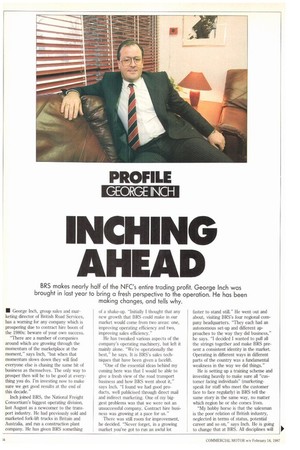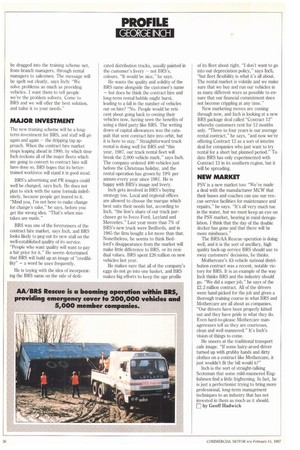INCHING AHEAD
Page 36

Page 38

If you've noticed an error in this article please click here to report it so we can fix it.
BRS makes nearly half of the NFC's entire trading profit. George Inch was brought in last year to bring a fresh perspective to the operation. He has been making changes, and tells why.
• George Inch, group sales and marketing director of British Road Services, has a warning for any company which is prospering due to contract hire boom of the 1980s: beware of your own success.
"There are a number of companies around which are growing through the momentum of the marketplace at the moment," says Inch, "but when that momentum slows down they will find everyone else is chasing the same bit of business as themselves. The only way to prosper then will be to be good at everything you do. I'm investing now to make sure we get good results at the end of this decade."
Inch joined BRS, the National Freight Consortium's biggest operating division, last August as a newcomer to the transport industry. He had previously sold and marketed fork-lift trucks in Britain and Australia, and run a construction plant company. He has given BRS something
of a shake-up. "Initially I thought that any new growth that BRS could make in our market would come from two areas: one, improving operating efficiency and two, improving sales efficiency."
He has tweaked various aspects of the company's operating machinery, but left it mainly alone. "We're operationally the best," he says. It is BRS's sales techniques that have been given a facelift.
"One of the essential ideas behind my coming here was that I would be able to give a fresh view of the road transport business and how BRS went about it," says Inch. "I found we had good products, well publicised through direct mail and indirect marketing. One of my biggest problems was that we were not an unsuccessful company. Contract hire business was growing at a pace for us."
There was still room for improvement, he decided. "Never forget, in a growing market you've got to run an awful lot faster to stand still." He went out and about, visiting I3RS's four regional company headquarters. "They each had an autonomous set-up and different approaches to the way they did business," he says. "I decided I wanted to pull all the strings together and make BRS present a consistent identity in the market. Operating in different ways in different parts of the country was a fundamental weakness in the way we did things."
He is setting up a training scheme and investing heavily to make sure all "customer facing individuals" (marketingspeak for staff who meet the customer face to face regularly) in BRS tell the same story in the same way, no matter which region he or she comes from.
"My hobby horse is that the salesman is the poor relation of British industry, neglected in terms of status, potential career and so on," says Inch. He is going to change that at BRS. All disciplines will be dragged into the training scheme net, from branch managers, through rental managers to salesmen. The message will be spelt out clearly, says Inch: "We solve problems as much as providing vehicles. I want them to tell people we're the problem solvers. Come to BRS and we will offer the best solution, and tailor it to your needs."
MAJOR INVESTMENT
The new training scheme will be a longterm investment for BRS, and staff will go again and again — the dripping tap approach. When the contract hire market stops leaping ahead in 1990, by which time Inch reckons all of the major fleets which are going to convert to contract hire will have done so, BRS hopes that its bettertrained workforce will stand it in good stead.
BRS's advertising and PR images could well be changed, says Inch. He does not plan to stick with the same formula indefinitely, because people get inured to it. "Mind you, I'm not here to make change for change's sake," he says, before you get the wrong idea. "That's when mistakes are made."
BRS was one of the forerunners of the contract hire market, says Inch, and BRS looks likely to peg out its new stall on the well-established quality of its service. "People who want quality will want to pay a fair price for it." He seems determined that BRS will build up an image of "credibility" — a word he uses frequently.
He is toying with the idea of incorporating the BRS name on the side of dedi cated distribution trucks, usually painted in the customer's livery — not BRS's, colours. "It would be nice," he says.
He wants the quality and solidity of the BRS name alongside the customer's name — but does he think the contract hire and long-term rental bubble might burst, leading to a fall in the number of vehicles out on hire? "No. People would be reticent about going back to owning their vehicles now, having seen the benefits of using a third party like BRS. The writing down of capital allowances was the catapult that sent contract hire into orbit, but it is here to stay." Straightforward truck rental is doing well for BRS and "this year, 1987, our truck rental fleet will break the 2,000 vehicle mark," says Inch. The company ordered 400 vehicles just before the Christmas holiday, and the rental operation has grown by 19% per annum every year since 1981. He is happy with BRS's image and livery.
Inch gets involved in BRS's buying strategy too. Local and regional offices are allowed to choose the marque which best suits their needs but, according to Inch, "the lion's share of our truck purchases go to Iveco Ford, Leyland and Mercedes." Last year more than 7% of BRS's new truck were Bedfords, and in 1985 the firm bought a lot more than that. Nonetheless, he seems to think Bedford's disappearance from the market will make little difference to BRS, or its residual values. BRS spent £26 minion on new vehicles last year.
He makes sure that all of the company's eggs do not go into one basket, and BRS makes big efforts to keep the age profile
of its fleet about right. "I don't want to go into our depreciation policy," says Inch, "but fleet flexibility is what it's all about. The rental market is volatile and we make sure that we buy and run our vehicles in as many different ways as possible to ensure that our financial commitment does not become crippling at any time."
New marketing moves are coming through now, and Inch is looking at a new BRS package deal called "Contract 12" whereby customers rent for 12 months only. "Three to four years is our average rental contract," he says, "and now we're offering Contract 12 as a sort of interim deal for companies who just want to try rental for a short but planned period." To date BRS has only experimented with Contract 12 in its southern region, but it will be spreading.
NEW MARKET
PSV is a new market too: "We've made a deal with the manufacturer MCW that their buses and coaches can use our rescue service facilities for maintenance and repairs," he says. "It's all very much toe in the water, but we must keep an eye on the PSV market, bearing in mind deregulation. I think that the day of the double decker has gone and that there will be more minibuses."
The BRS/AA Rescue operation is doing well, and it is the sort of ancillary, high quality back-up service BRS should use to sway customers' decisions, he thinks.
Mothercare's 43-vehicle national distribution contract was a recent, notable victory for BRS. It is an example of the way Inch thinks BRS and the industry should go. "We did a super job," he says of the £2.2 million contract. All of the drivers were hand-picked for the job and given a thorough training course in what BRS and Mothercare are all about as companies. "Our drivers have been properly kitted Out and they have pride in what they do. Even hard-to-please Mothercare manageresses tell us they are courteous, clean and well mannered." It's Inch's vision of things to come.
He sneers at the traditional transport cafe image. "If some hairy-arsed driver turned up with grubby hands and dirty clothes on a contract like Mothercare, it just wouldn't fit the bill would it?"
Inch is the sort of straight-talking Scotsman that some mild-mannered Englishmen find a little frightening. In fact, he is just a perfectionist trying to bring more professional, long-term management techniques to an industry that has not invested in them as much as it should. E by Geoff Hadwick




















































































